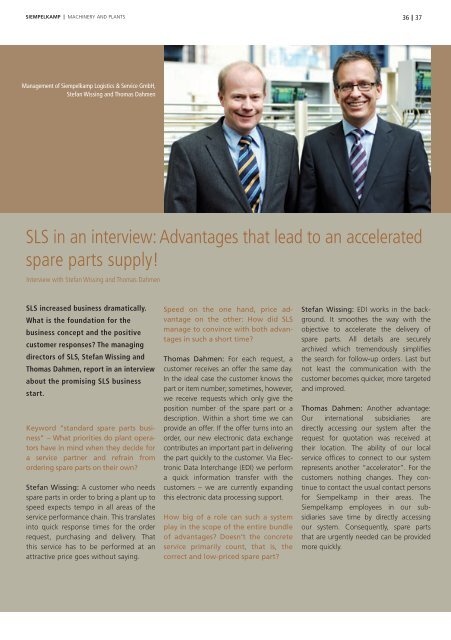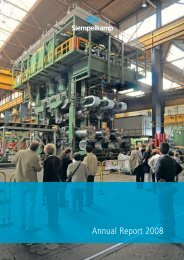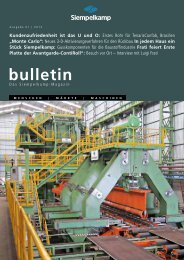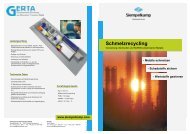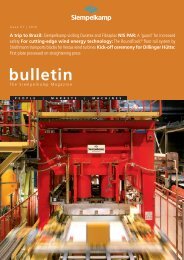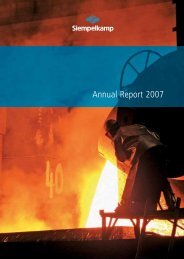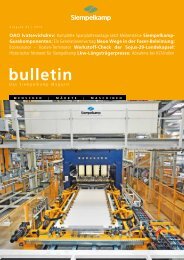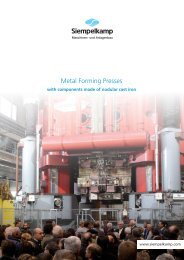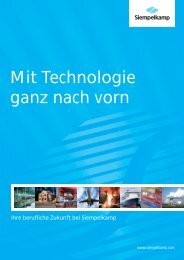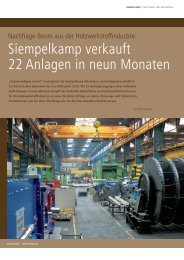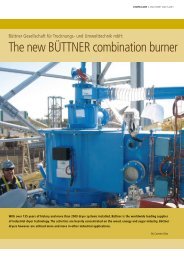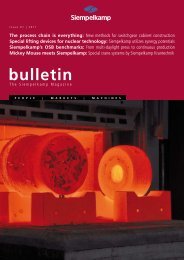Bulletin 2/2010 - Siempelkamp NIS
Bulletin 2/2010 - Siempelkamp NIS
Bulletin 2/2010 - Siempelkamp NIS
You also want an ePaper? Increase the reach of your titles
YUMPU automatically turns print PDFs into web optimized ePapers that Google loves.
SIEMPELKAMP | MACHINERY AND PLANTS 36 37<br />
Management of <strong>Siempelkamp</strong> Logistics & Service GmbH,<br />
Stefan Wissing and Thomas Dahmen<br />
SLS in an interview: Advantages that lead to an accelerated<br />
spare parts supply!<br />
Interview with Stefan Wissing and Thomas Dahmen<br />
SLS increased business dramatically.<br />
What is the foundation for the<br />
business concept and the positive<br />
customer responses? The managing<br />
directors of SLS, Stefan Wissing and<br />
Thomas Dahmen, report in an interview<br />
about the promising SLS business<br />
start.<br />
Keyword “standard spare parts business”<br />
– What priorities do plant operators<br />
have in mind when they decide for<br />
a service partner and refrain from<br />
ordering spare parts on their own?<br />
Stefan Wissing: A customer who needs<br />
spare parts in order to bring a plant up to<br />
speed expects tempo in all areas of the<br />
service performance chain. This translates<br />
into quick response times for the order<br />
request, purchasing and delivery. That<br />
this service has to be performed at an<br />
attractive price goes without saying.<br />
Speed on the one hand, price advantage<br />
on the other: How did SLS<br />
manage to convince with both advantages<br />
in such a short time?<br />
Thomas Dahmen: For each request, a<br />
customer receives an offer the same day.<br />
In the ideal case the customer knows the<br />
part or item number; sometimes, however,<br />
we receive requests which only give the<br />
position number of the spare part or a<br />
description. Within a short time we can<br />
provide an offer. If the offer turns into an<br />
order, our new electronic data exchange<br />
contributes an important part in delivering<br />
the part quickly to the customer. Via Electronic<br />
Data Interchange (EDI) we perform<br />
a quick information transfer with the<br />
customers – we are currently expanding<br />
this electronic data processing support.<br />
How big of a role can such a system<br />
play in the scope of the entire bundle<br />
of advantages? Doesn‘t the concrete<br />
service primarily count, that is, the<br />
correct and low-priced spare part?<br />
Stefan Wissing: EDI works in the background.<br />
It smoothes the way with the<br />
objective to accelerate the delivery of<br />
spare parts. All details are securely<br />
archived which tremendously simplifi es<br />
the search for follow-up orders. Last but<br />
not least the communication with the<br />
customer becomes quicker, more targeted<br />
and improved.<br />
Thomas Dahmen: Another advantage:<br />
Our international subsidiaries are<br />
directly accessing our system after the<br />
request for quotation was received at<br />
their location. The ability of our local<br />
service offi ces to connect to our system<br />
represents another “accelerator”. For the<br />
customers nothing changes. They continue<br />
to contact the usual contact persons<br />
for <strong>Siempelkamp</strong> in their areas. The<br />
<strong>Siempelkamp</strong> employees in our subsidiaries<br />
save time by directly accessing<br />
our system. Consequently, spare parts<br />
that are urgently needed can be provided<br />
more quickly.


